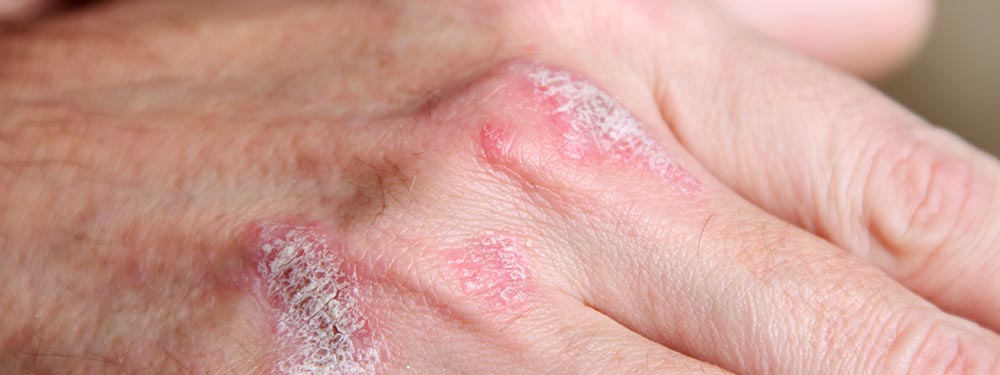Psoriatic arthritis is a condition that causes joint pain, swelling, or stiffness, and typcially effects people who have a long-term skin condition called psoriasis.
People with psoriasis have patches of thick, red skin that are often covered by silver or white scales. It can also affect the spine in some people. Stiffness in the joints or low back is usually worse in the morning and lasts 30 minutes or longer. It usually gets better with exercise. Psoriatic arthritis can affect joints on one or both sides of the body. It usually affects more than one joint.
Symptoms of Psoriatic Arthritis
Psoriatic arthritis can affect joints on just one side or on both sides of your body. The signs and symptoms of psoriatic arthritis often resemble those of rheumatoid arthritis. Both diseases cause joints to become painful, swollen and warm to the touch.
- Swollen fingers, toes, hands, or feet
- Nail pitting or nail coming up off the nail bed
- Lower back pain
- Eye pain or redness
Diagnosis of Psoriatic Arthritis
Diagnosing psoriatic arthritis can be a tricky process because its symptoms frequently mimic those of other forms of inflammatory arthritis, such as rheumatoid arthritis (RA) and gout. It can also be confused with osteoarthritis (OA), the most common form of arthritis.
For a proper diagnosis, the primary care doctor will likely provide a referral to a rheumatologist, a type of doctor who specializes in arthritis and musculoskeletal diseases. A diagnosis is based on many things, including a thorough medical history and the results of a physical examination and medical tests.
Treatment of Psoriatic Arthritis
There is no cure for psoriatic arthritis, but different treatments can help ease and control symptoms. Treatment for joint symptoms usually involves one or more of the following: NSAIDs such as ibuprofen, naproxen, methotrexate or lefluonimide, and in some cases may require biologic medications such as Enbrel or Humira.
Prevention of Psoriatic Arthritis
You can soothe your psoriatic arthritis symptoms with a combination of exercise, medicines, and other treatments. Your doctor can tell you exactly what you need to do. Chances are, these tactics will be high on his list, right next to taking your medicines.
Need Help Affording Medications?
Patients who are having difficulty paying for their medications, and who have federally funded Medicare, Medicaid, TRICARE, or commercial insurance, may qualify for additional support from the following foundations below:
- Chronic Disease Fund | www.cdfund.org | 877-968-7233
- Patient Access Network Foundation | www.panfoundation.org | 866-316-7263
- The Healthwell Foundation | www.healthwellfoundation.org | 800-675-8416
- Patient Advocate Foundation | www.copays.org | 866-512-3861



